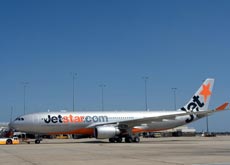According to Circular 103 which published the decision, the cap price of VND 1.7 million for economy class will still be applied to some sole routes of Vietnam Airlines, the national airline company.
Vietnam Airlines is the sole airline flying on more than 20 domestic routes, including routes to Dien Bien Phu city, Phu Quoc Island and Con Dao Island. Vietnam Airlines and Jetstar Pacific Airlines are the two primary airlines offering services on other domestic routes. Two new private airlines are expected to enter the market soon –Vietjet Air and Indochina Airlines.
 Vietnam Airlines and Jetstar Pacific Airlines supported the cap lift, saying that passengers would gain in that while companies could more easily regulate flight schedules.
Vietnam Airlines and Jetstar Pacific Airlines supported the cap lift, saying that passengers would gain in that while companies could more easily regulate flight schedules.
Luong Hoai Nam, general director of Jetstar Pacific Airlines, said that these new regulations would prove far more beneficial than the price cap.
Nam said that without the price cap, airlines would be able to diversify fares based on demand and supply of routes according to each month, day and even hour.
For instance, flights at 9 am could be VND 1 million, while more convenient 11 am flights would be the costliest, Nam said.
Vietnam Airlines said that the new regulations would partly ease over-demand on routes from Ho Chi Minh City to Hanoi approaching Tet, and on the route from Hanoi to HCM City after Tet.
The airline did confirm, however, that they would not increase the fare on flights around the 2009 Tet holidays, despite the new regulations.
They continued that to meet demand approaching the nation’s biggest yearly festival, they would increase their flight capacity by 33 percent over last year, between HCM City and Hanoi and between HCM City and Da Nang. Some, however, expressed concern that the new regulation could lead to the two airlines to mutually increase their fares.
The Ministry of Finance addressed this concern, saying that air fares still had to be registered with the ministry. Airlines are required to register with the two ministries 15 days before applying the new prices.
The two ministries would consider expenses, demand and supply and fuel prices when deciding to approve the new fares.